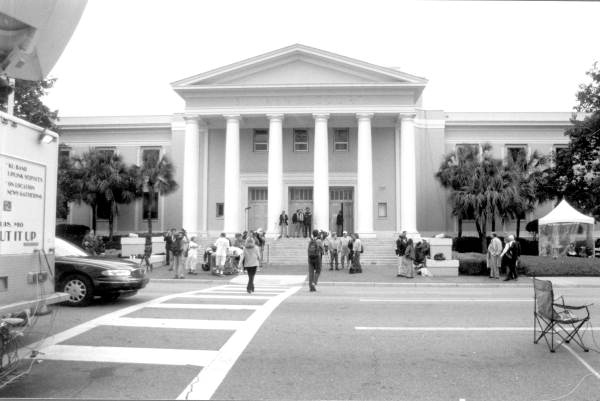by Diane Roberts | October 26, 2020
How Florida Became the Great Democratic Sinkhole
Florida’s twisted past, present and fast-approaching future in our chaotic national elections.

Florida is a state of many talents. We can concoct a tourist attraction out of absolutely anything: the Birthplace of Gatorade in Gainesville, Punta Gorda’s plaque honoring the First White Man to Die in America, the Tupperware museum in Orlando and Wausau’s possum monument. We can play with our food and eat it, too. Sometimes we fry mullet; sometimes we get liquored up and compete to see who can toss mullet farthest down the beach. When it comes to felonious activity, Florida’s scofflaws commit offenses of staggering creativity, often involving at least two of the following: nudity, alligators, meth, fast food, puppies, cross-dressing, machetes and exotic pets. Other states simply cannot compete. Florida’s fascinating topography is second to none in surprises: where else can a sinkhole just open up one day and swallow your house? No other state can boast such architectural richness, either, from the demented mashup of Moorish, Byzantine, and Palladian buildings in Coral Gables to the aluminum-wrapped Solomon’s Castle in Hardee County to ersatz Celebration, the model village built by Disney where every Christmas they dump soap flakes on the streets and call it “snow.”
And let us not forget Florida’s dipsomania-tinged contributions to American literature. Tennessee Williams and Ernest Hemingway lived part time in Key West and often got drunk there (though not together); Jack Kerouac died in St. Petersburg; and the great Harry Crews who, though he was born in Bacon County, Georgia, spent most of his life in our beloved state, largely in bars adjacent to the University of Florida until, as he so elegantly wrote: “One day I woke up and the band had gone home and I was lying in the broken glass with a shirt full of puke and I said, ‘Hey, man, the ball game’s up.’”
ELECTILE DYSFUNCTION
Yet when it comes to elections, Florida has no talent. None. Nada. We suffer from electile dysfunction. The nation laughs at us and calls us “Flori-duh.” There are so many lawsuits, what with Florida’s alleged election officials often incapable of designing a decent ballot (looking at you, Broward County: who puts the U.S. Senate race in the bottom left corner where people could easily miss it?) or figuring out who is actually allowed to vote, much less count the ballots correctly.
Yet when it comes to elections, Florida has no talent. None. Nada. We suffer from electile dysfunction.
In 2018, nearly two-thirds of Florida voters passed a constitutional amendment to allow many former felons to vote. But, as is their wont, the governor and the Florida Legislature jumped in with legislation to negate the will of the voters (we obviously don’t know what we’re doing, right?) making the former felons, who have served their time, also pay any and all remaining court costs, restitution, dry-cleaning bills and Pinochle debts or else no exercising the franchise for them! The gubmint essentially reinstated a poll tax, a throwback to the bad old days of Jim Crow. Unjust as it seems, this was recently upheld by a federal court. The former felons who either couldn’t scrape together the money or even find out how much they owe (very common, since many older court records were on paper and have been lost or discarded) are still denied their rights, despite the best efforts of philanthropists Michael Bloomberg and LeBron James.
As if that wasn’t enough of a slap upside Democracy’s venerable head, the state online registration system collapsed like cheap lawn furniture on the last day to become a bona fide Florida voter before November’s general election, likely denying thousands the ability to cast a ballot. While the registration system did briefly reopen for several hours, voters’ rights groups sued to get the deadline extended even further. The judge threw up his hands: “Every man who has stepped foot on the Moon launched from the Kennedy Space Center, in Florida. Yet, Florida has failed to figure out how to run an election properly—a task simpler than rocket science.”
CONFUSION REIGNED
Perhaps you’ve noticed there’s another election happening, er, now. We can only pray that it’s actually over by November 4th. The thing is, if Florida plays its usual part (the personification of Chaos) the election could go on for weeks. Maybe longer. Maybe till there’s a vaccine for COVID-19. Who knows? In addition to the many more cases of coronavirus medical experts are warning us about, and perhaps a December hurricane or two, plus a plague of frogs for good measure, we may be looking at a nation careening around like a drunk riding a grocery cart.

Everybody who was sentient at the time remembers the presidential imbroglio of 2000 when it took five weeks to find out whether Al Gore or George Bush won—still being debated in some quarters—five weeks, 47 lawsuits, hundreds of hanging, dangling or pregnant chads, and a secretary of state who liked to compare herself to the biblical Queen Esther (more on that later). But Florida’s history as a democratic sinkhole goes way further back, all the way to the presidential election of 1876, which actually took until March 1877 to resolve.
Democrat Samuel Tilden apparently beat Republican Rutherford B. Hayes, needing (if you believe the initial vote count) just one electoral vote to prevail. At least, that’s what the Democrats said, though the electoral votes from Oregon, South Carolina, Louisiana and Florida were in dispute. Keep in mind that in olden days, the Democrats were the conservatives, the pro-slavery party before the Civil War, and the Republicans were the anti-slavery party (more or less), the party of Lincoln, the ones running Reconstruction. (The two parties didn’t switch brains until some time in the 1960s after then-President Lyndon Johnson signed the Civil Right Acts and Richard Nixon’s “Southern Strategy” convinced a lot of white people that they were the real victims.)
Anyway, the Republicans claimed that because the Democrats used violence and intimidation to terrorize voters, they didn’t really win the 1876 election, and, because Republicans controlled more state election boards, decided to throw out Democratic votes, declaring Hayes the winner. Democrats balked. Confusion reigned and politicians raged until Congress set up a 15-man (and it was all men in those days, of course) commission comprised of equal parts senators, representatives, and members of the U.S. Supreme Court. Meanwhile, a secret deal was cut: Louisiana, South Carolina and Florida would support the Republican Hayes if he’d withdraw federal troops from the South, ending Reconstruction. This move paved the way for 100 years of segregation and—not at all coincidentally—Florida’s Jim Crow felony disenfranchisement, which had been formally added to the Constitution in 1868. Florida’s landed gentry and business leaders continued to do their damnedest to thwart the 15th Amendment of the United States Constitution by making small crimes (stealing a loaf of bread, say) a felony, thus officially denying many formerly enslaved people the right to vote. When the feds left in 1877, giving up on Reconstruction, white folks came up with their own name for this event They called it “Redemption.”
RECOUNT REVELRY
I guess we shouldn’t have been surprised at what happened in 2000. I mean, history has a way of haunting a place. By that time, Florida had become a nearly 50-50 state. Democrats officially held a majority in voter registration, but many of those were “Dixiecrats,” conservatives who tended to vote Republican. Older readers will remember that the state was called for Republican George W. Bush, that call got reversed, Democrat Al Gore retracted his concession, and every campaign operator, pollster, lawyer and reporter from Svalbard to Tierra del Fuego got on a plane to watch a real live constitutional crisis play out in a state which never, to put it delicately, had a reputation for high seriousness. Think about it: Florida’s most famous inhabitant is a talking rodent.
Damn, the recount was fun. Fun in an end-of-civilization kind of way. I became what the colonizers of developing nations in old movies would call a “native guide,” helping confused journalists who thought the whole state was some kind of endless summer Miami Beach find decent sushi and a place to buy a sweater and an umbrella. Nobody told them North Florida in November was cold. And wet. And that we eat grits. I advised Agence France-Presse camera persons and BBC commentators to order the Capri eggplant sandwich with a dirty martini at Waterworks and take an afternoon off to see the manatees at Wakulla Springs. I helped some of them find a place to stay when they got kicked out of their hotel rooms for the FSU-UF game weekend. If you ain’t from around here, it’s difficult to understand how a bunch of super-sized 20-year-old boys crashing into each other over an ovoid ball could outrank the endless court challenges in Palm Beach County or the threats of Florida’s legislators to impose a slate of Republican electors even if the Democrats won the recount. I just looked deep into their eyes and explained that presidents come and presidents go, but this game had national championship implications.
Nobody told them North Florida in November was cold. And wet.
And that we eat grits.
Things got weirder: banana republics called Florida a “banana republic.” Fidel Castro’s foreign minister recommended a new election and offered to send “democracy monitors” to help us out. A bunch of what The Wall Street Journal described as “white lawyers with cell phones and Hermès ties” staged a noisy and sometimes violent protest against the court-ordered recount of 10,000-plus votes in Miami, effectively shutting it down. This became known as the “Brooks Brothers Riot.” Meanwhile, Secretary of State Katherine Harris, the official in charge of Florida’s elections, felt embattled. Unfairly criticized by pundits and politicos alike. Ridiculed, just because she was an heiress, the granddaughter of citrus baron Ben Hill Griffin Jr., knew how to rock a smoky eye and presided over the biggest voting mess in American history. Seems she stalked around her capitol office suite quoting Queen Esther, who was so damned pretty she stopped the Persians from killing all the Jews, but was ready to sacrifice herself if necessary, intoning: “If I perish, I perish.” Apparently, Katherine Harris said it so often that some staffers would mutter under their breath, “So perish already.”

The U.S. Supreme Court finally put an end to the hijinks on December 12, essentially declaring George W. Bush the winner by 537 votes. Florida felt a little bereft. We had been the center of the political universe for five whole weeks. Not only was the whole world watching, the whole world had finally learned to spell “Tallahassee.” No longer did the television trucks line Duval Street. No longer were there former U.S. secretaries of state lurking at the bar in Cypress. The reporters ran off whence they came. The lawyers turned back into bats and flew away into the evening sky.
FAMILY MATTERS
But don’t despair, Floridians! This year could be bigger and stranger and louder than any of our previous election kerfuffles. Both the Democrats and the Republicans are lawyered up to the eyeballs, laying in cases of Red Bull and Doritos, ironing their crisp white shirts and starching their underpants. And because nothing changes as much as anyone thinks, we can count on some familiar faces to make an appearance, old favorites like Roger Stone, adviser and friend to Donald Trump. Stone is the guy convicted of lying to Congress and six other felonies, then commuted by the current occupant of the White House. He’s also the man with the Richard Nixon tattoo on his back and claims to be the mastermind of the Brooks Brothers Riot. Surely, he could never resist the lure of more Florida mayhem. Sadly, Dexter Douglass, Al Gore’s brilliant Florida counsel, the charming gent who’d appear on CNN to answer questions about the Democrats’ trial strategy and end up discussing castrating cattle, has gone to the Big Law Office in the Sky.
But lots of 2000 veterans are still around. David Boies, who argued Bush v. Gore (for Gore) in the high court, is still lawyering, representing everybody from the NFL to the NBA to one of Jeffrey Epstein’s victims. Twenty years ago, Brett Kavanaugh and John Roberts were fresh young legal eagles helping the Republican party stop the recount in Florida. Now they’re on the U.S. Supreme Court. In addition, Amy Coney Barrett, not long out of Notre Dame’s Law School, the woman who’ll soon join them on the bench, parachuted into Florida to help the GOP clean up the ballot mess for George W. Bush.
It’s sort of like a family, isn’t it? A perverse family with lots of secrets, some criminal history, no end of eccentricities and obsessions. Think of this year’s Florida presidential election this way: there will probably be so many COVID-19 cases in November we’ll be in lockdown over Thanksgiving. There may be no college football on TV, what with large percentages of SEC teams going down with the ‘rona. At least we can watch our republic unravel in real time as Florida slowly, slowly sinks into the sea.





